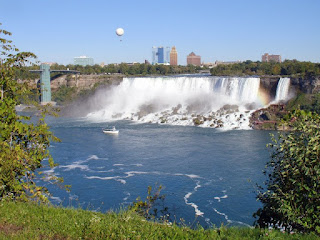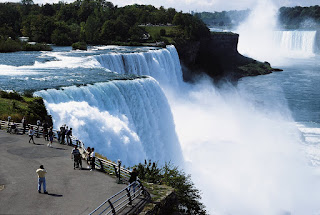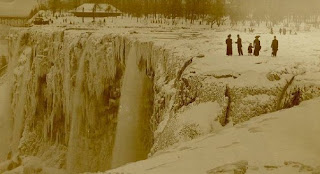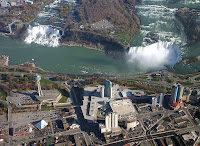
Niagara Falls is a city in Niagara County, New York, United States. As of the 2000 census, the city had a total population of 55,593. It is across the Niagara River from Niagara Falls, Ontario, both named after the famed Niagara Falls which they share. It is part of both the Buffalo-Niagara Falls Metropolitan area and the Western New York region.
The City of Niagara Falls was incorporated on March 17, 1892. Governor Roswell L. Flower signed a bill into law forming the city. Thomas Vincent Welch who was a member of the charter committee and then a New York Assemblyman, but more
importantly a second-generation Irishman, was there when the bill was signed, and responsible for asking Governor Flower to sign the bill on St.Patrick's Day. Historically, the city was built up around factories that utilized the power of the falling water for energy. Now the downtown area borders a park (Niagara Falls State Park) affording a close-up view of the American, Horseshoe and Bridal Veil Falls. The European migration into the area began in the 17th Century with missionaries and explorers. This influx of newcomers may have been a catalyst for already hostile native tribes to turn to open warfare in competition for the fur trade.
importantly a second-generation Irishman, was there when the bill was signed, and responsible for asking Governor Flower to sign the bill on St.Patrick's Day. Historically, the city was built up around factories that utilized the power of the falling water for energy. Now the downtown area borders a park (Niagara Falls State Park) affording a close-up view of the American, Horseshoe and Bridal Veil Falls. The European migration into the area began in the 17th Century with missionaries and explorers. This influx of newcomers may have been a catalyst for already hostile native tribes to turn to open warfare in competition for the fur trade.

By the end of the 19th Century, the city was a heavy industrial area, due in no small part to the huge power potential offered by the swiftly-flowing Niagara River. The city still has a relatively strong industrial base, but its location is away from the tourist areas.
 The neighborhood of Love Canal gained national media attention in 1978 when United States President Jimmy Carter declared a federal emergency there, and hundreds of residents were relocated.[1] Starting in 1920, the area had been used as a landfill for chemical waste disposal (and later, industrial toxic waste) before its development as a residential area. The Superfund law, which protects people, families, communities and others from heavily contaminated toxic waste sites, was enacted in 1980 in response to the Love Canal situation.
The neighborhood of Love Canal gained national media attention in 1978 when United States President Jimmy Carter declared a federal emergency there, and hundreds of residents were relocated.[1] Starting in 1920, the area had been used as a landfill for chemical waste disposal (and later, industrial toxic waste) before its development as a residential area. The Superfund law, which protects people, families, communities and others from heavily contaminated toxic waste sites, was enacted in 1980 in response to the Love Canal situation. While its Canadian twin, Niagara Falls, Ontario, began massively building up its tourism industry in the 1990s, allowing for casinos and tall tower hotels, essentially becoming the "Las Vegas of Canada," Niagara Falls, New York, maintained its less commercial and more natural appearance. However, in 2004, the Seneca Nation of Indians opened the Seneca Niagara Casino in the former Niagara Falls Convention and Civic Center, thereby establishing sovereign Native American territory in the midst of the city.
While its Canadian twin, Niagara Falls, Ontario, began massively building up its tourism industry in the 1990s, allowing for casinos and tall tower hotels, essentially becoming the "Las Vegas of Canada," Niagara Falls, New York, maintained its less commercial and more natural appearance. However, in 2004, the Seneca Nation of Indians opened the Seneca Niagara Casino in the former Niagara Falls Convention and Civic Center, thereby establishing sovereign Native American territory in the midst of the city.

